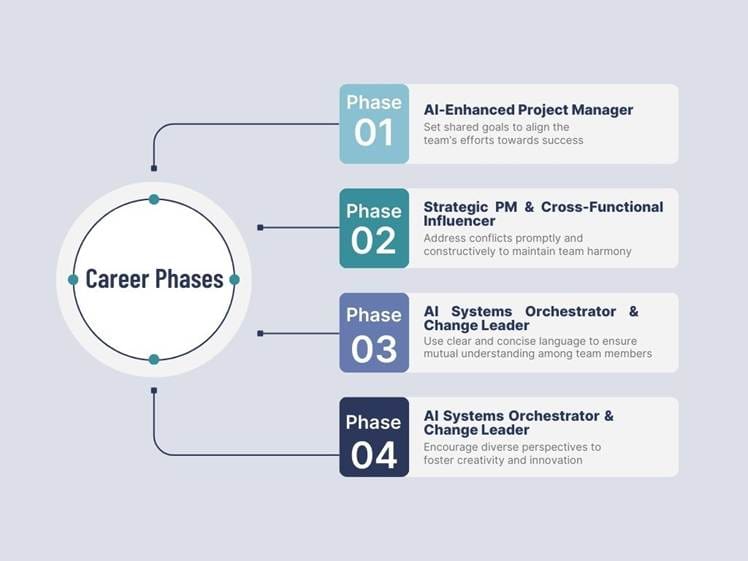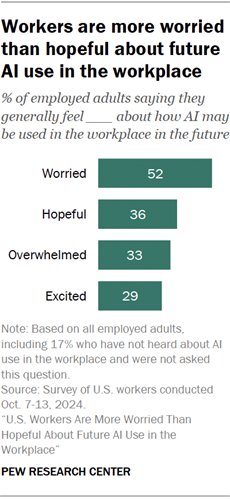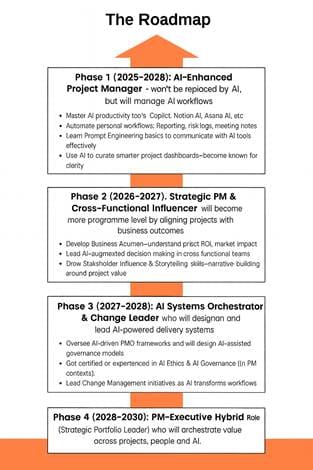Part 4 of the AI & Project Management Series
At a Glance
The PM Role is Transforming
AI is already being used by 75% of knowledge workers. For project managers outside this group, the ground is shifting quickly. Those who thrive will lead the AI revolution, not resist it.
AI isn’t just automating tasks. It’s redefining what it means to be a project manager. When was the last time your value came from chasing updates or maintaining Gantt charts? Those are necessary evils, not the work that drives outcomes.
Tomorrow’s PM operates differently: as AI orchestrator, strategic influencer, and human systems leader. They focus on solving organizational challenges, navigating stakeholders, and shaping company direction. The opportunity is enormous—but so is the risk of irrelevance.

Like every technological revolution, project management will evolve through phases. Knowing them offers a roadmap to growth in an AI-augmented future.
If you'd like to skip the reading and just watch the interview with Nayla Goodwin, then check out the video below.
The Four-Phase Evolution
AI is reshaping project management in a way that mirrors past technological revolutions. Understanding the four phases will help you position yourself for success at each stage and prepare for what’s next.

Phase 1: The AI-Enhanced PM (2025–2026)
Tool mastery and productivity define this stage. PMs automate admin work, build AI dashboards, and practice prompt engineering. Early adopters—like those who embraced Excel decades ago—gain a decisive edge.
Phase 2: The Strategic PM & Cross-Functional Influencer (2026–2027)
AI moves from personal tools to organizational integration. PMs shift into strategic partners, using AI insights to align work with business goals. Business acumen—ROI, market impact, strategic alignment—is critical. Storytelling becomes a superpower, translating AI outputs into compelling narratives for leadership.
Phase 3: AI-Orchestrated Processes & Governance (2027–2028)
AI begins orchestrating enterprise workflows—analyzing risk, optimizing resources, and prioritizing portfolios. PMs act as conductors of AI-powered systems. Skills expand to governance, ethics, and change management, with systems thinking essential for balancing interconnected, AI-driven processes.
Phase 4: AI as Executive Co-Pilot & Innovation Leader (2028–2030)
AI becomes an advisory partner in executive decision-making. PMs rise as portfolio leaders, orchestrating value across people, projects, and AI. They collaborate with C-suites, shape transformation programs, and build AI-human cultures. Their role: ensuring human judgment anchors AI-driven systems.
The Implementation Reality: Resistance & Culture
Most organizations are stuck in Phases 1–2, despite advanced tools. It’s the same mistake seen in Agile—adopting Jira didn’t make companies agile, and deploying ChatGPT doesn’t mean integration.
True transformation comes in Phase 3, when AI drives decision-making and adaptability. The biggest barrier? Middle management resistance. Agile threatened control; AI challenges hierarchies.
Pew Research shows the divide:
- 52% of workers worry about AI’s future impact.
- 32% fear fewer job opportunities.
- 36% feel hopeful, while 33% feel overwhelmed.

Shifting from controller to orchestrator requires cultural adaptation. Most organizations won’t move beyond Phase 2 until 2027–2028, giving PMs time to prepare.
Join Data Punk Media today and explore the different data stories we publish.
Your Professional Development Roadmap
Now that we've gone through the four phases, the question remains how to navigate your career through those phases. Below is a summary view of how you as a project manager can navigate the coming AI wave.

Phase 1: Building Your AI Foundation (2025–2026)
- Master tools like Copilot, Asana AI.
- Automate dashboards, risk logs, and reporting.
- Learn prompt engineering for effective communication.
- Use AI for planning, cost estimation, and team updates.
Phase 2: Developing Strategic Partnership (2026–2027)
- Build ROI analysis and market alignment skills.
- Advance sprint planning and portfolio management.
- Become a business storyteller, translating AI insights into compelling business cases.
Phase 3: Mastering Orchestration (2027–2028)
- Oversee AI-powered workflows with human oversight.
- Lead governance, bias detection, and ethical reviews.
- Drive change management and cross-functional risk analysis.
Phase 4: Executive Leadership (2028–2030)
- Influence strategy at the C-suite level.
- Design AI-human collaboration cultures.
- Mentor the next generation of PMs.
- Optimize structures while preserving human judgment.
Understanding AI’s Relationship with Information
PMI’s Shaping the Future of Project Management With AI stresses data literacy as a core competency. PMs must understand how AI consumes data to judge when outputs are reliable.
Data literacy helps PMs:
- Tailor AI tools to project contexts.
- Spot risks and inconsistencies.
- Protect integrity by knowing when human judgment is essential.
Without this awareness, PMs risk blindly accepting flawed AI outputs.

Prompt Engineering: The New Core Skill
Working with AI is like managing a talented but inexperienced team member—fast, analytical, but dependent on clear direction. Prompt engineering is the art of framing problems with precision and context. Clear prompts yield actionable results. Ethan DeWaal, Asana’s AI Program Manager, likens AI to a golden retriever: eager to help but in need of instruction. His framework:
- Persona: “You are an expert at…”
- Goal: “Your goal is to…”
- Task: “Your task is to…”
- Context: “Here is all the context you need…”
As AI evolves, this remains essential: PMs must learn to communicate effectively with machines.
The Competitive Advantage of Human Skills
AI transforms the mechanical side of PM, but raises the value of human strengths:
- Emotional intelligence: Reading signals, building trust, navigating tension.
- Critical thinking: Spotting big-picture implications, solving complex problems creatively.
- Judgment under ambiguity: Balancing competing interests with both data and intuition.
As AI handles routine analysis, these skills become more valuable, not less.
Your Career Evolution
AI is creating roles that didn’t exist five years ago. PMs who can link technology to business outcomes will stand out. They will bridge domains, influence strategy, and ensure oversight where human judgment is essential.
The most successful won’t just manage projects—they’ll direct transformation itself.
The Path Forward
AI in project management is not just a tech shift—it’s an elevation of the profession. The best PMs will treat AI as a partner, focusing on strategy, relationships, and judgment.
The challenge is mindset: will you compete against algorithms or orchestrate them?
Interested in reading more data stories? Check out all our series at Monthly Stories.
A New Beginning
Across this series, we’ve moved from the $312B problem of project failures to the AI tools transforming workflows. We mapped the four phases that separate those who thrive from those who lag.
The future isn’t hypothetical—it’s here. PMs who embrace AI will define the profession’s next era. Those who resist it, risk obsolescence.
Your journey starts with one choice: Will you design your future—or let someone else?
The roadmap is ready.
The tools exist.
The opportunity is yours.

